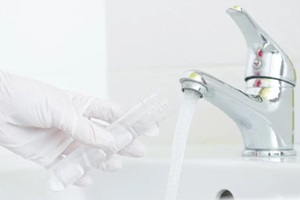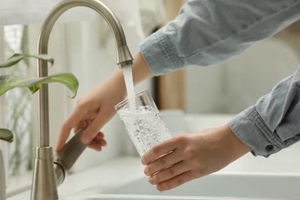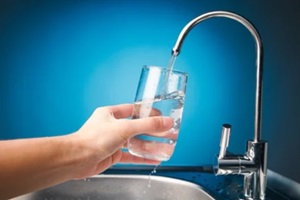 Sustainability and energy efficiency have always been used as performance metrics for water appliances. It’s common to blame the manufacturer whenever these products malfunction unexpectedly, but the root cause may be water quality.
Sustainability and energy efficiency have always been used as performance metrics for water appliances. It’s common to blame the manufacturer whenever these products malfunction unexpectedly, but the root cause may be water quality.
Most tap water is hard, meaning its concentration of minerals is high. Prolonged use of hard water causes a buildup of limescale in water appliances, which causes blockages and reduces their efficiency and lifespan.
Water softening systems solve this problem by removing the minerals from the water using ion exchange technology.
This article will discuss how water-softening systems improve appliance efficiency and lifespans, helping consumers save money and energy.
Effects of Hard Water on Appliances
As groundwater — the main source of tap water — percolates through rocks, it dissolves minerals such as calcium, magnesium, and manganese, resulting in a high concentration of soluble ions.
When this water is heated in home appliances, the solubility of these ions decreases. Eventually, they precipitate as calcium carbonate and small traces of magnesium and manganese carbonates, commonly known as limescale.
Over time, limescale builds up around the heating elements of the appliance. This makes the appliance consume more energy while heating water.
The buildup acts as an insulator, resulting in higher utility bills for consumers. It also shortens their lifespan. These costs can be avoided by using a water-softening system.
How Water Softening Systems Work
As the naming suggests, water softeners reduce the hardness of water by removing minerals through ion exchange technology. Here’s how the process works:
Ion Exchange
Ion exchange replaces the hardness-causing ions in water with sodium ions. These systems have a resin tank filled with negatively charged polystyrene beads usually coated with positively charged sodium ions.
As hard water traverses the resin tank, calcium and magnesium ions are attracted and stick to the negatively charged beads as they exhibit polarity.
Sodium ions also detach from the beads and replace the calcium and magnesium ions in the water.
Regeneration
 After some time, the resin beads get saturated with calcium and magnesium ions and are, therefore, unable to soften more water.
After some time, the resin beads get saturated with calcium and magnesium ions and are, therefore, unable to soften more water.
This is when regeneration occurs, a process where a concentrated salt solution is flushed through the resin tank. This washes the calcium and magnesium ions away, replenishing the sodium ions on the beads.
Rinsing
After regeneration, the system will have an excess salt solution and may still have some remaining calcium and magnesium ions.
A quick rinse with fresh water removes the excess salt and ions, which would otherwise contaminate or harden the water. The system softens the water until the resin tank becomes saturated again, initiating another regeneration cycle.
Benefits of Water Softening Systems
Hard water may not be harmful to human health, other impurities notwithstanding. However, it affects water appliances, plumbing works, and the household budget. By softening water, homeowners can enjoy the following benefits:
- Lower utility bills: Soft water doesn’t induce limescale buildup in water appliances. As such, appliances operate more efficiently, lowering electricity consumption.
- Lower maintenance costs: When appliances are in good working condition, cases of malfunctioning are minimized. Homeowners are less likely to spend on appliance repair or replacement.
- Prolonged lifespan of appliances: Removing limescale buildup helps prevent corrosion and damage to heating elements. Also, appliances are not overworked, reducing wear and tear and extending appliance lifespan.
- Reduced use of cleaning products: Hard water reacts with soap to form scum which makes it difficult for the soap to lather. As such, homeowners are forced to use more detergent than necessary. Soft water doesn’t react with soap, reducing its usage and costs.
- Better laundry results: Hard water makes it difficult for laundry detergent to dissolve completely, resulting in dull and gray clothing. Soft water ensures detergent dissolves properly, leading to brighter and cleaner-looking clothes.
- Plumbing System Longevity: The minerals in hard water deposit on the insides of plumbing work, such as pipes, faucets, and shower heads. This can cause blockages, thereby reducing water flow and increasing internal pressure that can lead to leaks or pipe bursts. Water softening systems remove the precipitating minerals, resulting in better water flow and extending the lifespan of the plumbing infrastructure.
Keep Your Water Appliances Running with Hawaiian Cool Water
 Water softening is integrated into water filtration systems rather than being a standalone unit. As such, homeowners can enjoy the benefits of clean, healthy drinking water in addition to the perks of soft water.
Water softening is integrated into water filtration systems rather than being a standalone unit. As such, homeowners can enjoy the benefits of clean, healthy drinking water in addition to the perks of soft water.
This fosters a more ecological and cost-efficient way of living. Hawaiian Cool Water’s water filtration systems have the latest ion exchange technology to deliver clean and delicious drinking water.
Its top-of-the-line systems also help improve the efficiency and longevity of water appliances and plumbing works. Contact Hawaiian Cool Water today to learn about its water softening and filtration solutions.


